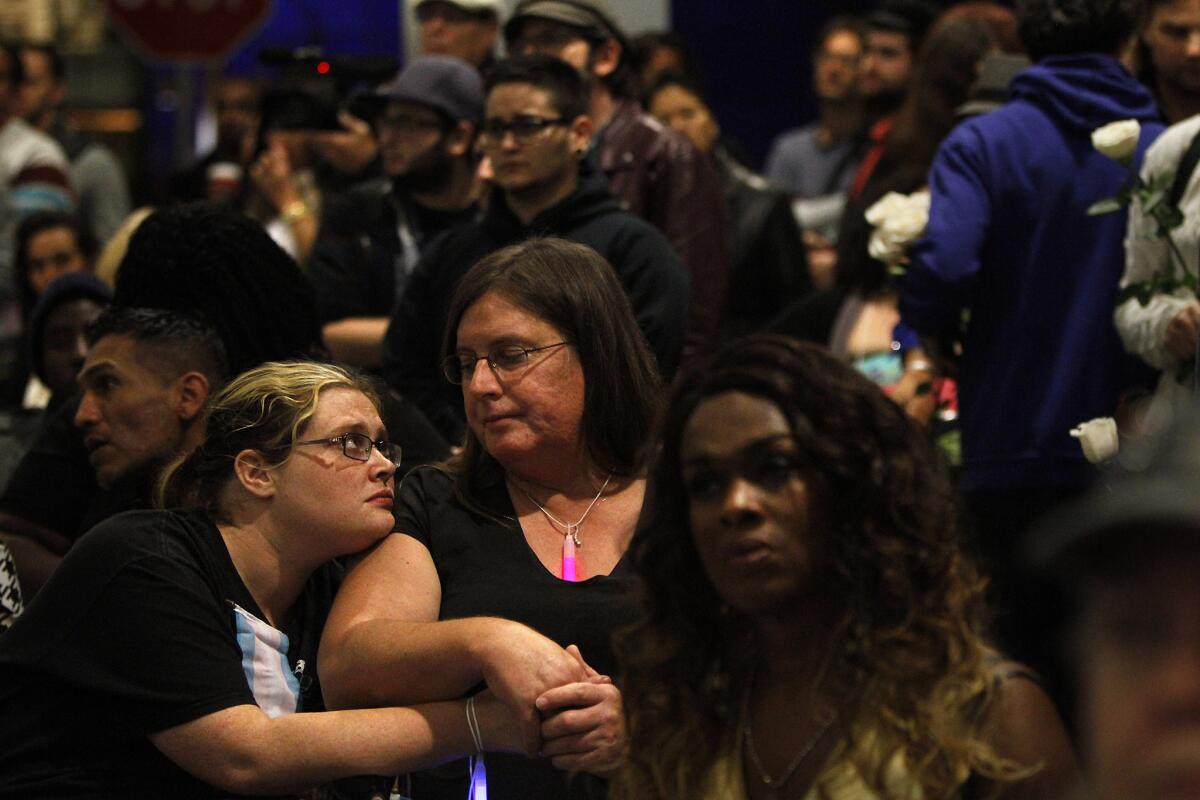Transgender study looks at ‘exceptionally high’ suicide-attempt rate

- Share via
A whopping 41% of people who are transgender or gender-nonconforming have attempted suicide sometime in their lives, nearly nine times the national average, according to a sweeping survey released three years ago.
In a new study released Tuesday, researchers dug deeper into that number, analyzing the results of the National Transgender Discrimination Survey to examine what puts transgender people at such “exceptionally high” risk.
Researchers from the American Foundation for Suicide Prevention and the Williams Institute at UCLA School of Law found that the risk of attempting suicide was especially severe for transgender or gender nonconforming people who had suffered discrimination or violence, such as being physically or sexually assaulted at work or school.
Among transgender people who became homeless because of bias against their gender identity, 69% said they had tried to kill themselves. Out of those who had been turned away by a doctor because they were transgender or gender-nonconforming, 60% had attempted suicide sometime in their lives, the survey found.
Nearly two-thirds of respondents who were the victims of domestic violence at the hands of a family member had attempted suicide, the study also showed. Suicide attempts were less common among transgender and gender-nonconforming people who said their family ties had remained strong after they came out.
“This report punctuates what PFLAG families know is fundamental -- that there is life-saving merit, demonstrable value, and paramount need for family acceptance,” said Diego Sanchez, policy director for PFLAG National, an organization for family, friends and supporters of LGBT people.
Being “out” as transgender was also tied to steeper risk, the study showed: People who tell everyone that they are transgender or gender-nonconforming, or who said that other people could always or usually tell that they were transgender, were more likely to have attempted suicide.
Researchers wrote that being recognized as transgender by other people probably made them a target of more discrimination, putting them at greater risk -- a finding that echoes earlier research.
Having a mental health condition increased the chance that a transgender or gender-nonconforming person had attempted suicide, as did having a lower income or being HIV-positive. But researchers said that the most stunning finding was just how high the risk was for all transgender and gender-nonconforming people, no matter how much money they made, how much education they had, or whether they were single or married.
Even transgender people at comparatively “low” risk were still much more likely to have attempted suicide than the general population, they wrote, with “lows” often ranging from 30% to 40%. Transgender and gender-nonconforming people who had gotten graduate degrees, for instance, had a lifetime risk of attempting suicide of 31% -- lower than less-educated transgender people, but still astoundingly high.
“It’s alarming all across the board,” said Jody L. Herman, manager of transgender research at the Williams Institute.
Researchers cautioned that it remains unclear whether the earlier survey, which included more than 6,400 people, was representative of the entire transgender and gender-nonconforming population of the United States. However, other surveys in the U.S. and abroad have also suggested “an unparalleled level of suicidal behavior among transgender adults,” they wrote.
Twitter: @latimesemily
More to Read
Sign up for Essential California
The most important California stories and recommendations in your inbox every morning.
You may occasionally receive promotional content from the Los Angeles Times.










